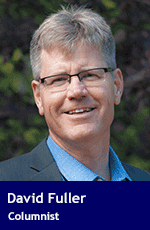 I feel old. For the second time in a month, I’ve pulled a muscle in my back. It’s left me sore, stiff and walking like an old man.
I feel old. For the second time in a month, I’ve pulled a muscle in my back. It’s left me sore, stiff and walking like an old man.
Yet I’m truly blessed that my life has been filled with good health – with the exception of injuries and concussions derived from my life of activity, and the odd case of burnout.
It seems that only in pain do we appreciate wellness. Those who are not well will give almost anything to be restored to health.
The pursuit of wellness – whether physical, mental or spiritual – underpins our need to feel whole. It’s often difficult to find balance in our lives. However, without wellness – or at least a recognition and acceptance of what we are – this balance is almost always elusive.
Balancing money is also difficult for many people. As psychologist Abraham Maslow wrote, we’re motivated to work to fulfil our basic needs. Yet each generation has a different relationship with money.
My grandmother, who lived through the Dirty ’30s, felt the need to scrimp and save to ensure there was money for that rainy day. Her relationship with money was different from that of her children, or my generation or my children.
Is happiness the point of human life? by Dana Wilson
Entrepreneurs have a different relationship with money than those working for big business or government because there’s no safety net for retirement other than savings. Business owners and often their employees realize they need savings to ensure a livelihood in retirement, if retirement is to be a reality.
In many Western countries, the retirement age has been moved from 65 to 68 to ensure there are benefits for retirees.
However, compound the thought of retirement with staggering personal and corporate debt loads and you can understand the lack of balance.
So how does all this affect any pursuit of happiness?
Simply in the fact that true happiness shouldn’t be derived from a healthy body or a healthy bank account.
In 2008, I travelled to remote parts of Uganda, which had been ravaged by years of warfare and atrocities. There was little money, many health issues as a result of insufficient access to clean water, and absolutely no safety nets to cover retirement. If you could find a good income with work beyond your plot of land, you were counted as one of the lucky ones.
Yet everywhere I travelled, the people seemed happy. Their happiness seemed rooted in their relationships rather than their worldly possessions. Theirs was a different life than the one put forward by a corporate and government mentality.
It was also not driven by consumption of expendable goods. Nor was it shaped by the notion that relationships promote disease, and that human interaction at work and in public should be banned and shamed.
Perhaps the lesson we need to learn today, in the wake of recent economic difficulties, is that while the pursuit of money doesn’t lead to happiness, the lack of money is admittedly very stressful. The cost of isolation and fear might be much higher and even more deadly than the illness caused by this pandemic. And the economic crisis forced by lockdowns is having an impact on our health and happiness, as well as our money.
The sooner that we recognize we need common sense in a pandemic response and not more restrictions, the sooner our population can resume its pursuit of happiness.
Dave Fuller, MBA, is an award winning business coach and a partner in the firm Pivotleader Inc.
For interview requests, click here. You must be a Troy Media Marketplace subscriber to access our Sourcebook.
The views, opinions and positions expressed by columnists and contributors are the author’s alone. They do not inherently or expressly reflect the views, opinions and/or positions of our publication.

